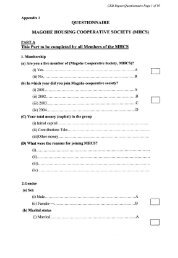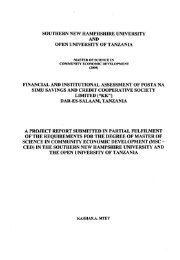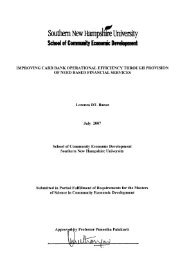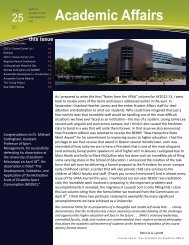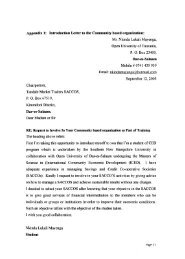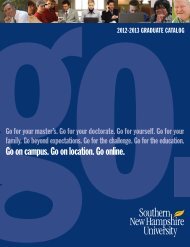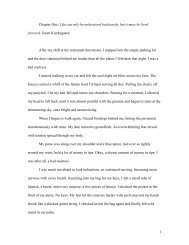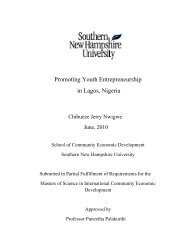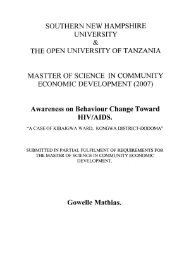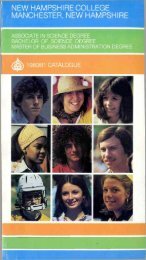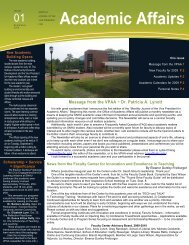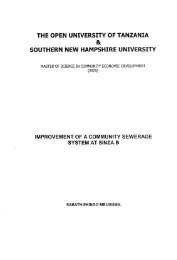Undergraduate Catalog 2010-2011 - SNHU Academic Archive ...
Undergraduate Catalog 2010-2011 - SNHU Academic Archive ...
Undergraduate Catalog 2010-2011 - SNHU Academic Archive ...
You also want an ePaper? Increase the reach of your titles
YUMPU automatically turns print PDFs into web optimized ePapers that Google loves.
Course Descriptions<br />
riculum. Students will promote literacy in the content areas<br />
by developing lesson plans that incorporate cognitive strategies<br />
for reading, writing, speaking and viewing.<br />
Prerequisites: EDU 200, EDU 208, 12 credits in major content<br />
and acceptance into TCP.<br />
EDU 320 Methods of Teaching English I (3 credits)<br />
This course prepares students to teach reading and literature<br />
in grades 5-12. The course will cover textbook analysis,<br />
vocabulary development, study skills and reading theory,<br />
including “reading to learn.” Students will learn how to<br />
teach literature, prepare lesson plans, and design and evaluate<br />
essay questions. Adolescent literature, English as a second<br />
language and instructional resources also will be<br />
covered. Twenty hours of field experience is included.<br />
Students should take this course prior to student teaching<br />
and should have taken at least four courses in language and<br />
literature above the freshman level. Prerequisites: 12<br />
Literature credits and acceptance into TCP.<br />
EDU 326 Methods of Teaching Social Studies (3 credits)<br />
This course prepares students to teach history, civics, government<br />
and other social sciences in grades 5-12. The course<br />
is designed to introduce students to major issues, teaching<br />
strategies and resources pertaining to teaching history and<br />
social studies in middle and secondary school. The course<br />
emphasizes teaching through the development of actual lesson<br />
plans and curricula. This course may require off-campus<br />
field experiences. Prerequisites: EDU 200, EDU 318, 12 credits<br />
in concentration and acceptance into TCP.<br />
EDU 330 Mathematics Instruction for Young Children<br />
(3 credits)<br />
This course covers the mathematical development of young<br />
children from birth to age eight as well as scientifically valid<br />
strategies for facilitating development in various areas,<br />
including, but not limited to: mathematical terminology,<br />
symbols, and representations; number properties and number;<br />
standard arithmetical operations; number operations<br />
and computational techniques; patterns, relations, and functions;<br />
types and properties of geometric figures; basic geometric<br />
concepts; relationship between standard algorithms<br />
and fundamental concepts of algebra and geometry; measurement<br />
instruments, units, and procedures for problems<br />
involving length, area, angles, volume, mass and temperature;<br />
collection, organization, and analysis of data; and the<br />
application of mathematical reasoning to analyze and solve<br />
problems. This course covers both normative and non-normative<br />
development of mathematical skills. This course<br />
aligns with national and state standards and with NECAP.<br />
Prerequisite: Acceptance into TCP.<br />
EDU 335 Methods of Teaching Elementary Mathematics<br />
(3 credits)<br />
This course is a study of mathematics taught in grades K-6<br />
and the current methods for teaching this content. Extensive<br />
experience with manipulative materials is provided.<br />
Prerequisites: Six credits of college math with a grade of “C”<br />
or better, EDU 200, completion of 60 credits, and acceptance<br />
into TCP. Offered every semester.<br />
EDU 344 Integrated Curriculum Methods (3 credits)<br />
This course is a multidisciplinary, multisensory, hands-on<br />
experience in which students work with mentors in a classroom<br />
setting. Students will observe, teach, self-evaluate and<br />
develop an integrated unit. Content areas will include science<br />
and social studies. On-site participation is required.<br />
This course is offered to education students who entered<br />
the university prior to 2003-2004. Prerequisites: EDU 335;<br />
acceptance into TCP.<br />
EDU 361 Emerging and Early Literacy: Developing<br />
Reading and Writing in Grades K-4 (3 credits)<br />
The course will examine several major theoretical perspectives<br />
on literacy development from K though 4th grade.<br />
Students will learn how to create literacy environments that<br />
encourage the development of reading, writing, listening and<br />
speaking in the early elementary classroom. Students will<br />
also learn a variety of effective strategies for the instruction<br />
and assessment of reading and writing in the early elementary<br />
classroom. Differentiating instruction to meet the needs<br />
of students from diverse backgrounds will be integrated into<br />
the course content. Prerequisites: EDU 200 or DEV 150 and<br />
DEV 320 or EDU 245, and acceptance into TCP.<br />
EDU 362 Literacy in the Content Areas Grades 4-8<br />
(3 credits)<br />
In this course, students will study effective practices to support<br />
the development of reading and language arts for students<br />
in grades 4-8. The course will focus on the reading and<br />
writing of literature and expository text as a foundation for<br />
learning with an emphasis on reading comprehension,<br />
research and study skills, and vocabulary development.<br />
Students will examine ways to address the needs of students<br />
with diverse cultural, language, and learning requirements.<br />
Prerequisites: EDU 200 and acceptance into TCP.<br />
EDU 363 Reading Facilitation for all Learners (3 credits)<br />
This course focuses on the attributes of struggling readers<br />
and in diagnosing reading difficulties and developing reading<br />
intervention plans. Students will do a case study by performing<br />
a reading diagnosis of one struggling reader,<br />
developing an intervention plan and beginning its implementation.<br />
Prerequisites: EDU 361, EDU 362, and acceptance<br />
into TCP.<br />
EDU 370 Science for Early Learners (3 credits)<br />
This course applies developmental theory to the construction<br />
of curriculum and methods for health and science in<br />
early childhood. Students focus on preparing developmentally<br />
appropriate lessons that promote investigation, problem<br />
solving, and exploration. Methods of instruction and assessment<br />
are practiced. Attention will be given to designing constructivist<br />
lesson and unit plans that align with NH State<br />
Standards and NAEYC Standards. Prerequisite: Acceptance<br />
into TCP.<br />
EDU 371 Curriculum, Instruction & Assessment (K-4)<br />
(3 credits)<br />
This course is an introduction to curriculum, instruction and<br />
assessment for teaching content in grades K-4. Using science<br />
education as a context, this course investigates learning from<br />
121



